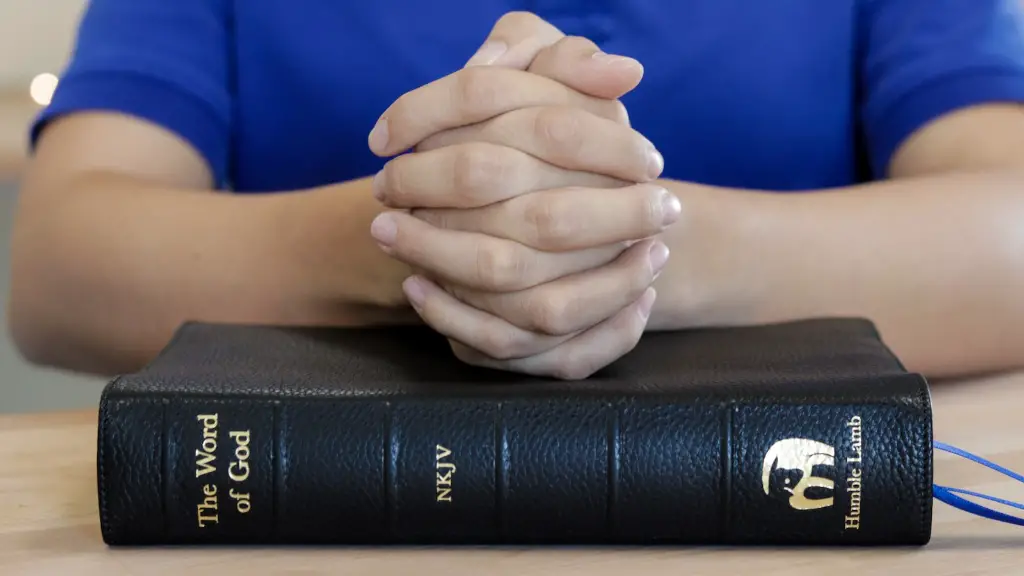Origin of Slavery In The Bible
The Bible is abundant in scriptures that suggest slave ownership was considered socially acceptable and common during the time it was written. It mainly discussed slavery in the context of an existing institution and did not condone the establishment of new slave ownership. In the Old Testament book of Leviticus, the Mosaic law permitted Hebrews to enslave people from other nations, as well as their own kind, as a punishment. Deuteronomy also contains rules limiting the duration of such practices and providing guidelines on how to treat slaves kindly.
The New Testament delivers mixed messages when it comes to slavery, although Jesus himself never approves slavery in any capacity. He instead, focused on the spiritual matters, rather than condemning the basic institution. Most of the teachings found in the New Testament offer advice on how to treat slaves justly. This can be seen throughout the Gospels, epistles and Revelation.
Impact of Bible on Slavery
The Bible’s teachings about slavery have been heavily debated over the centuries, largely because these teachings can be interpreted in different ways. While some people view them as an endorsement of the institution, others view them as instructions for how to deal with an existing cultural reality. Looking beyond the text, though, it’s clear that the Bible did not create the institution of slavery, but rather, how it responded to it.
Slaveholders in the ancient world would often cite Bible verses to legitimize their practices and provide a religious justification for it. For instance, the Apostle Paul instructed slaves to honor their masters and be obedient, even if they were harsh. Paul also advised slaves to work obediently for those masters, and to avoid the temptation to return to their original status as a slave.
Modern Reinterpretations Of Slavery
In modern times, many theologians and religious scholars have reinterpreted the Bible’s teachings on slavery in a more humane way. Today, most interpretations of the Bible look beyond the literal words to consider the spirit of its teachings. This has informed a more ethical view of slavery, and modern day scholars very rarely view the Bible as sanctioning slavery and oppression.
Furthermore, the Bible is seen to be a moral guide to how Christians should live today, and this includes treating all people equally and with respect and dignity, regardless of their social status. This is seen in the Golden Rule, which has its roots in the Bible, and states that a person should treat others as they themselves would be treated.
Significance Of Present-day Slavery
Despite the Bible’s progressive messages on slavery and oppression, the reality is that there is still much work to be done in terms of freeing people from slavery in the present day. Poverty, corruption and weak labor laws can trap individuals into a life of bondage, with some victims not even realizing that they are enslaved.
Human trafficking is one of the worst forms of modern slavery, where victims are frequently coerced into prostitution, forced labor or debt bondage. While this practice is strictly outlawed in many countries, it is still prevalent and estimated to generate over $150 billion dollars a year in profits for traffickers around the world.
Combating Slave Trade
In light of the ongoing prevalence of modern slavery and human trafficking, many individuals and organizations have initiated a number of initiatives to combat the slave trade. Countries are beginning to take more decisive action, with Belgium and Spain leading the way in Europe by criminalizing the procurement and trafficking of human beings.
International organizations like the UN and the International Labour Organization are also playing an increasingly active role in combating modern slavery, by monitoring the issue, raising awareness and advocating for greater collective responsibility. Additionally, the legal framework for prosecuting traffickers has also been strengthened in recent years to ensure that those responsible are brought to justice.
Effects Of Slavery Today
The effects of modern-day slavery have been particularly devastating, with many victims of trafficking living in perpetual fear and psychological distress. Forced labor is widespread across the world, and includes sectors such as construction, garment manufacturing, domestic work and agricultural labor. Even when in-country labor laws are enforced, they are often disregarded by employers and a slave culture can emerge as a result.
The victims of modern-day slavery can suffer from a range of physical and psychological illnesses, due to long working hours and living conditions that are below their basic needs. Additionally, human trafficking victims can face emotional and social isolation, due to their lack of language skills or emotional support.
Recent Push for Development and Awareness
Over the past decade, numerous organizations and campaigns have been set up to publicly tackle the issue of slavery. These organizations are usually non-governmental, and work to increase public awareness, lobby governments and fund anti-trafficking initiatives. Moreover, these organizations also provide direct services to victims of slavery, such as medical care and psychological counseling.
In addition to the vital services they provide, these organizations also focus on empowering victims of slavery to help rebuild their lives and build a better future. For example, initiatives such as ‘Breaking the Chains’ work to provide vocational training and access to education to victims of the global slave trade.
Final Thoughts
It is clear that the world has a long way to go in fully ending slavery, although the current efforts demonstrate that governments and civil society are united in this fight. Slavery is a morally abhorrent practice, and it is essential that we address it with courage and humanity, rather than justifying or tolerating it. The Bible’s teachings can help to remind us that doing the right thing will always be more worthwhile than the wrong one.


